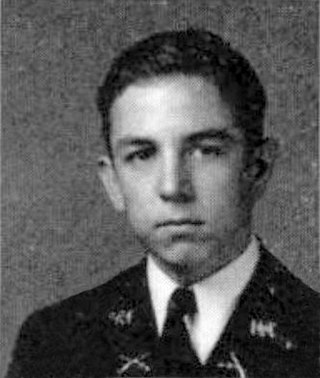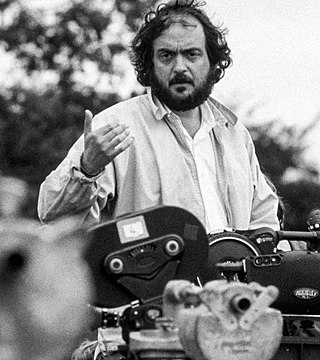
Dr. Strangelove or: How I Learned to Stop Worrying and Love the Bomb, known simply and more commonly as Dr. Strangelove, is a 1964 satirical black comedy film that satirizes the Cold War fears of a nuclear conflict between the Soviet Union and the United States. The film was directed, produced, and co-written by Stanley Kubrick and stars Peter Sellers, George C. Scott, Sterling Hayden, and Slim Pickens. The film is loosely based on Peter George's thriller novel Red Alert (1958).

Eyes Wide Shut is a 1999 erotic mystery psychological drama film directed, produced, and co-written by Stanley Kubrick. It is based on the 1926 novella Traumnovelle by Arthur Schnitzler, transferring the story's setting from early twentieth-century Vienna to 1990s New York City. The plot centers on a doctor who is shocked when his wife reveals that she had contemplated having an affair a year earlier. He then embarks on a night-long adventure, during which he infiltrates a masked orgy of an unnamed secret society.

Stanley Kubrick was an American film director, producer and screenwriter. Widely considered one of the greatest filmmakers of all time, his films—almost all of which are adaptations of novels or short stories—cover a wide range of genres and feature innovative cinematography, dark humor, realistic attention to detail and extensive set designs.

Terry Southern was an American novelist, essayist, screenwriter, and university lecturer, noted for his distinctive satirical style. Part of the Paris postwar literary movement in the 1950s and a companion to Beat writers in Greenwich Village, Southern was also at the center of Swinging London in the 1960s and helped to change the style and substance of American films in the 1970s. He briefly wrote for Saturday Night Live in the 1980s.

Peter Bryan George was a Welsh author, most famous for the 1958 Cold War thriller novel Red Alert, published initially with the title Two Hours to Doom and written using the pseudonym Peter Bryant. The book was the inspiration for Stanley Kubrick's classic movie Dr. Strangelove or: How I Learned to Stop Worrying and Love the Bomb.

Lolita is a 1962 psychological comedy-drama film directed by Stanley Kubrick and based on the 1955 novel of the same title by Vladimir Nabokov, who is also credited with writing the screenplay. The film follows Humbert Humbert, a middle-aged literature lecturer who becomes sexually infatuated with Dolores Haze, a young adolescent girl. It stars James Mason, Shelley Winters, Peter Sellers and, as the titular character, Sue Lyon.

Lolita is a 1997 drama film directed by Adrian Lyne and written by Stephen Schiff. It is the second screen adaptation of Vladimir Nabokov's 1955 novel of the same name and stars Jeremy Irons as Humbert Humbert and Dominique Swain as Dolores "Lolita" Haze, with supporting roles by Melanie Griffith as Charlotte Haze, and Frank Langella as Clare Quilty. The film is about a middle-aged male professor named Humbert who rents a room in the house of the widow Charlotte Haze and becomes sexually attracted to her adolescent daughter Dolores, also called "Lo" or "Lolita".
Christiane Susanne Kubrick is a German actress. She was born into a theatrical family, and was the wife of filmmaker Stanley Kubrick from 1958 until his death in 1999.
The 2001: A Space Odyssey score is an unused film score composed by Alex North for Stanley Kubrick's 1968 film, 2001: A Space Odyssey.
Anthony Harvey was an English filmmaker who began his career as a teenage actor, was a film editor in the 1950s and moved into directing in the mid-1960s. Harvey had fifteen film credits as an editor, and he directed thirteen films. The second film that Harvey directed, The Lion in Winter (1968), earned him a nomination for the Academy Award for Best Director. Harvey's career is also notable for his recurring work with a number of leading actors and directors including Terry-Thomas, Peter Sellers, Katharine Hepburn, Peter O'Toole, Richard Attenborough, Liv Ullman, Sam Waterston, Nick Nolte, the Boulting Brothers, Anthony Asquith, Bryan Forbes and Stanley Kubrick. He died in November 2017 at the age of 87.
The Stanley Kubrick Archive is held by the University of the Arts London in their Archives and Special Collection Centre at the London College of Communication. The Archive opened in October 2007 and contains material collected and owned by the film director Stanley Kubrick (1928–1999). It was transferred from his home in 2007 through a gift by his family. It contains much of Kubrick's working material that was accumulated during his lifetime.

Lolita is a 1955 novel written by Russian-American novelist Vladimir Nabokov. The novel is notable for its controversial subject: the protagonist and unreliable narrator, a middle-aged literature professor under the pseudonym Humbert Humbert, is obsessed with a 12-year-old girl, Dolores Haze, whom he kidnaps and sexually abuses after becoming her stepfather. "Lolita", the Spanish nickname for Dolores, is what he calls her privately. The novel was originally written in English and first published in Paris in 1955 by Olympia Press.
Hawk Films was a British film production company formed by American filmmaker Stanley Kubrick to produce his 1964 film Dr. Strangelove. Kubrick also used it as a production company for his later films A Clockwork Orange (1971), Barry Lyndon (1975), The Shining (1980), and Full Metal Jacket (1987).

The following is a list of unproduced Stanley Kubrick projects in roughly chronological order. During his long career, American film director Stanley Kubrick had worked on a number of projects which never progressed beyond the pre-production stage under his direction. Some of these projects fell into development hell or are officially cancelled.
The political and religious views of filmmaker Stanley Kubrick (1928–1999) have been subjects of speculation during his lifetime and after his death. It is generally agreed that Kubrick was fascinated by the possibilities of a supernatural reality, as reflected in 2001: A Space Odyssey (1968) and The Shining (1980).

Lolita (Лолита) is an opera in two acts by composer Rodion Shchedrin. Composed in 1992, it uses a Russian language libretto by the composer which is based on Vladimir Nabokov's 1955 novel of the same name, written in English. The opera premiered in 1994 at the Royal Swedish Opera, Stockholm, using a Swedish language translation of the original libretto.

A list of books and essays about Stanley Kubrick and his films:

Stanley Kubrick (1928–1999) directed thirteen feature films and three short documentaries over the course of his career. His work as a director, spanning diverse genres, is widely regarded as being extremely influential.
Part of the New Hollywood wave, Kubrick's films are considered by film historian Michel Ciment to be "among the most important contributions to world cinema in the twentieth century", and he is frequently cited as one of the greatest and most influential directors in the history of cinema. According to film historian and Kubrick scholar Robert Kolker, Kubrick's films were "more intellectually rigorous than the work of any other American filmmaker."
The personal life of Stanley Kubrick:










